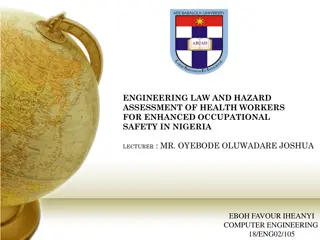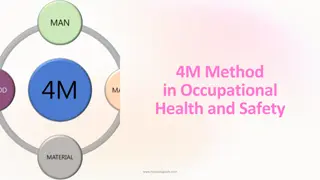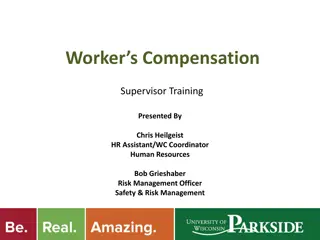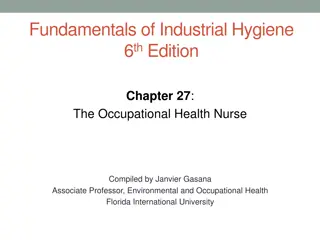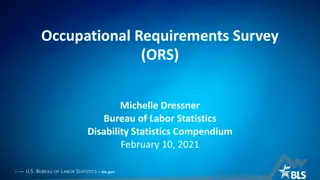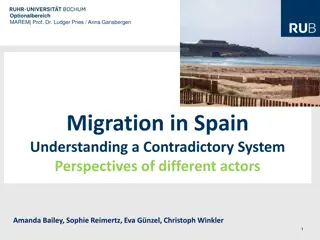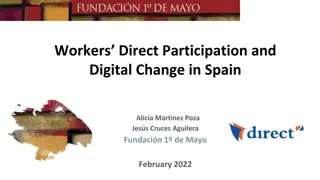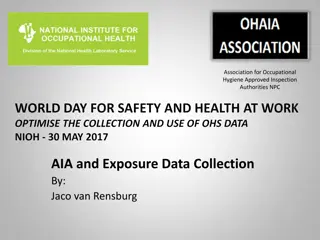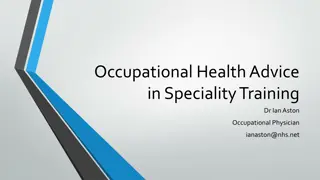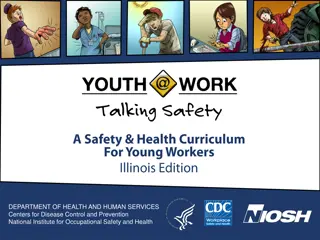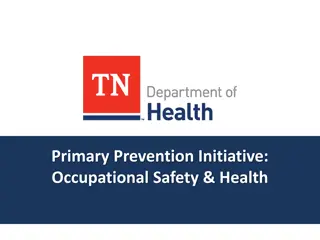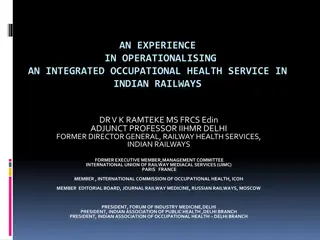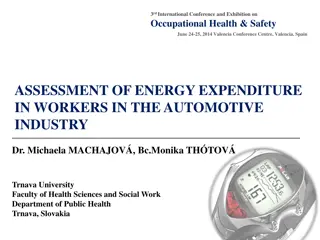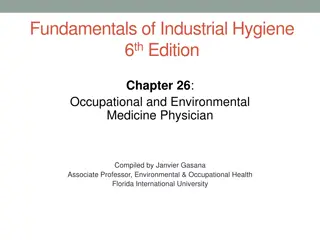Occupational Safety and Health of Posted Workers in Spain
This report by Ioana Roxana-Melenciuc, PhD, provides insight into the occupational safety and health issues faced by posted workers in Spain. It discusses the challenges and regulations in place to protect these workers, offering a comprehensive analysis of the Spanish study case. The report sheds light on the crucial aspects of ensuring a safe working environment for posted workers in the country.
Download Presentation

Please find below an Image/Link to download the presentation.
The content on the website is provided AS IS for your information and personal use only. It may not be sold, licensed, or shared on other websites without obtaining consent from the author. Download presentation by click this link. If you encounter any issues during the download, it is possible that the publisher has removed the file from their server.
E N D
Presentation Transcript
Country report The Spanish Study Case Ioana Roxana-Melenciuc, PhD, Lecturer National University of Political Studies and Public Administration Venice, 11 October 2011 POOSH Occupational Safety and Health of Posted Workers: Depicting the existing and future challenges in assuring decent working conditions and wellbeing of workers in hazardous sectors.
// Country report: The Spanish Study Case In a Union of equals, there can be no second class workers. If you do the same work in the same place, you should earn the same pay. European Commission President Jean-Claude Juncker, State of the Union Address, 13 September 2017
// Country report: The Spanish Stud Case Methodology Research questions: How does the interplay of EU-regulation and national OSH systems affect the health and safety of (posted) workers in a transnational workplace? Desk and fieldwork research: Literature review and data analysis of the primary sources like statistical data or the legal institutional framework Semi-structured interviews with: representatives of the actors involved in the process, such as policy-makers, state agencies, trade unions representatives, OSH representatives and other experts, on one hand, and on the other with Spanish posted workers Limitations
// Country report: The Spanish Study Case Variables The main actors that are involved in the process of developing/ implementing/ monitories OSH related issues; The main vulnerabilities regarding OSH; OSH in practice at transnational working places; Language/cultural barriers for the posting workers/migrants; Access to information.
// Country report: The Spanish Study Case Study case - Spain Ioana Roxana Melenciuc, PhD Ioana Dodi, PhD National University of Political Studies and Public Administration POOSH - Occupational Safety and Health of Posted Workers: Depicting the existing and future challenges in assuring decent working conditions and wellbeing of workers in hazardous sectors, VS/2016/0224 (EC)
// Country report: Study case - Spain Socio-economical context With the eruption of the financial crisis, the socio- economical context of Spain transformed a lot: between 2010 and 2014, the country changed from a net receiver to a net sender. The current data (2017) on posting show that there are 147,424 Spanish workers posted abroad, while 52,353 workers are posted in Spain. This has an impact on the development of the OSH system, as the focus switched from controlling the activity of companies that act as receivers of posted workers to that of monitoring and protecting the national workers that work abroad.
// Country report: Study case - Spain Stakeholders Ministry of Employment and Social Security Labour inspection Central/provincial - implications for departments Complaint of workers, trade unions etc Planned actions Sanctions National Institute of Safety and Hygiene Apart from the public institutions, there are a number of social partners involved in the process (Comisiones Obreras, Union General de Trabajadores, etc) Collaboration with labour inspections from other countries Senior Labour Inspectors Internal Market Information System
// Country reports: Study case - Spain Interviews Representative of the Comisiones Obreras Trade Union; Representative of the Uni n General de Trabajadores Trade Union Labour Inspector of the Ministry of Labour and Social Security Labour Inspector of the Basque Country 1 with a professor of International Public Law in the Basque Country 1 with a professor of Applied Sociology in the Complutense University in Madrid. 1 Spanish posted worker. All interviews were carried out between October and January 2017
// Country report: Study case - Spain Main vulnerabilities Accommodation periphery/ company s property Salary underpayment Health insurance only covers emergencies and serious accidents The European health insurance card only covers emergencies and very serious accidents. Workers have to pay beforehand to the health services of the host country and then they get the reimbursement, but it is not direct health care like in the country itself. Cases have been reported in which the workers could not access health care as they did not have the money to pay for the services in advance. There are many countries that have not regulated how work accidents must be reported. In Spain, the obligation of reporting a work accident was not regulated until the Royal Decree Law no. 9/2017. However, the investigation of a work accident of a posted worker requires the cooperation of the responsible institutions in both countries, which makes the process very time-consuming.
// Country reports: Study case - Spain Main vulnerabilities Protection at the workplace not in accordance with the regulations Social risks isolation Language communication/consultation/ socialization Important element in the vulnerability of the posted workers Communication Socialization/ integration Pursuing its own information about individual and collective rights Periods of posting insufficient routine and organization culture => Low probability of rejecting an unsafe procedure/ working environment
// Country report: Study case - Spain OSH in practice at transnational working places Contractor and subcontractor - joint liability Delegates of prevention Companies with more then 50 employees Cannot be dismissed No of hours to perform their tasks Tasks: o Monitor compliance with regulations o Advice for risk assessment and activity planning Trade Unions Health and safety disclosure Information providing to workers
// Country reports: Study case - Spain Language barriers The case of Spain is quite particular in what regards the language barriers of the workers that come to work in Spain (whether posted or not). The majority of them come from Portugal or Latin-American countries, which gives them the advantage of communicating easily. However, the problem stays real, as there are also workers that are posted in Spain and do not speak the same language (as it is the case of Romanians), as well as that of Spanish workers posted to work in other European countries. Prevention services that give language courses to workers No legal obligation when there is a very large presence of workers of a nationality The cultural barrier widens even more if the workers are accommodated far from the cities: they have few interactions with the locals, no social activities, thus leading to a feeling of inadequacy
// Country report: Study case - Spain Access to training and information No national information services Occupational health and safety cabinets of the autonomous communities Responsibility of the Employer Regulation collective agreements Differences according to professions Need for: Periodical training Harmonized standards
// Country reports: Study case - Spain Recommendations At the workplace level prevention and information services As it is very difficult to verify if the posted workers received the initial training before their arrival in the new workplace, the quality of the safety training received when the employee joins the company is very important. The responsibility of the quality of the safety training is at the level of the Labour Inspectorate, whereas the responsibility for delivering the trainings periodically should be at the level of the employer. At the sector level delegates of prevention in SMEs
// Country report: Study case - Spain Recommendatio ns At the national level A1 form submission deadline At the European level infrastructure for: Sharing information on accidents Detecting mailbox companies Eliminating informal obstacles of the European labor market * The current proposal of setting a European Labour Agency might be the solution for many of the issues at stake: facilitating and monitoring the dialogue between national counterparts in order to finish the investigations, harmonizing practices and quality check of the National Labour Inspectorates.
// Country report: The Spanish Study Case // Thank you! // SNSPA research team: - Ioana Meleniuc, PhD, Lecturer ES study case - Ioana Dodi, PhD, Lecturer ES study case - Ana Maria Costea, PhD, Lecturer RO study case - Andreea Farcas, PhD student RO study case




